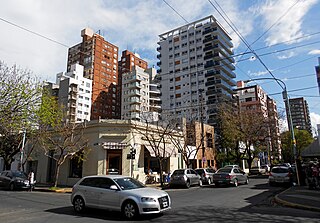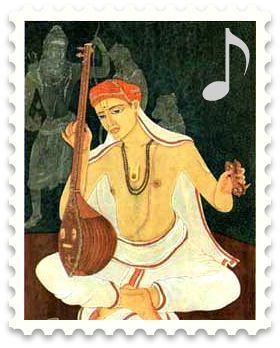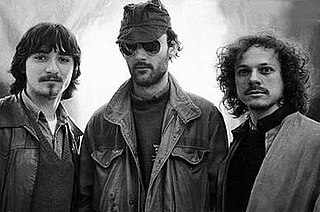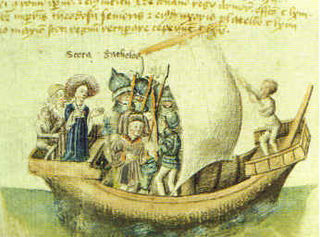Related Research Articles

In Norse mythology, Heimdall is a god. He is the son of Odin and nine mothers. Heimdall keeps watch for invaders and the onset of Ragnarök from his dwelling Himinbjörg, where the burning rainbow bridge Bifröst meets the sky. He is attested as possessing foreknowledge and keen senses, particularly eyesight and hearing. The god and his possessions are described in enigmatic manners. For example, Heimdall is golden-toothed, "the head is called his sword," and he is "the whitest of the gods."

An eponym is a person, a place, or a thing after which or for which someone or something is, or is believed to be, named. Adjectives derived from the word eponym include eponymous and eponymic.
Lee may refer to:

Quilmes is a city on the coast of the Rio de la Plata, in the province of Buenos Aires, Argentina, on the southeast end of the Greater Buenos Aires, being some 17 km (11 mi) away from the urban centre area of Buenos Aires. The city was founded in 1666 and is the seat of the eponymous partido (district).

On 26 December 2004, at 07:58:53 local time (UTC+7), a major earthquake with a magnitude of 9.2–9.3 Mw struck with an epicentre off the west coast of Aceh in northern Sumatra, Indonesia. The undersea megathrust earthquake, known by the scientific community as the Sumatra–Andaman earthquake, was caused by a rupture along the fault between the Burma plate and the Indian plate, and reached a Mercalli intensity of IX in some areas.

Folk music of Haryana has two main forms: classical folk music of Haryana and desi folk music of Haryana. They take the form of ballads and pangs of parting of lovers, valor and bravery, harvest and happiness.
Medical eponyms are terms used in medicine which are named after people. In 1975, the Canadian National Institutes of Health held a conference that discussed the naming of diseases and conditions. The conclusion, as summarized in The Lancet, was this: "The possessive use of an eponym should be discontinued, since the author neither had nor owned the disorder."

Azra was a Yugoslav rock band that was one of the most popular acts of the Yugoslav new wave music of the 1980s. Azra was formed in 1977 by its frontman Branimir "Johnny" Štulić. The other two members of the original line-up were Mišo Hrnjak (bass) and Boris Leiner (drums). The band is named after a verse from "Der Asra" by Heinrich Heine. They are considered to be one of the most influential bands from the Yugoslav new wave rock era and the Yugoslav rock scene in general.

The 1991 Perfect Storm, also known as The No-Name Storm and the Halloween Gale/Storm, was a damaging and deadly nor'easter in October 1991. Initially an extratropical cyclone, the storm absorbed Hurricane Grace to its south and evolved into a small unnamed hurricane later in its life. Damage from the storm totaled over $200 million and thirteen people were killed in total, six of which were an outcome of the sinking of Andrea Gail, which inspired the book and later movie, The Perfect Storm. The nor'easter received the name, playing off the common expression, after a conversation between Boston National Weather Service forecaster Robert Case and author Sebastian Junger.
In ancient Greece the chief magistrate in various Greek city states was called eponymous archon. "Archon" means "ruler" or "lord", frequently used as the title of a specific public office, while "eponymous" means that he gave his name to the year in which he held office, much like the Roman dating by consular years.
Russia, as the largest country in the world, has great ethnic diversity, is a multinational state, and is home to over 190 ethnic groups nationwide. According to the population census at the end of 2021, more than 147.1 million people lived in Russia, which is 4.3 million more than in the 2010 census, or 3.03%. At the same time, only 130.587 million census participants indicated their nationality. The top ten largest nations besides Russians included in descending order: Tatars, Chechens, Bashkirs, Chuvash, Avars, Armenians, Ukrainians, Dargins and Kazakhs. Population censuses in Russia allow citizens to report their nationality according not only to their ancestry, but also to self-identification. The 83 federal subjects which together constitute the Russian Federation include:

In medieval Irish and Scottish legend, Goídel Glas is the creator of the Goidelic languages and eponymous ancestor of the Gaels. The tradition can be traced to the 11th-century Lebor Gabála Érenn. A Scottish variant is recorded by John of Fordun.
Aram is a son of Shem, according to the Table of Nations in Genesis 10 of the Hebrew Bible, and the father of Uz, Hul, Gether and Mash or Meshech. The Book of Chronicles lists Aram, Uz, Hul, Gether, and Meshech as descendants of Shem, although without stating explicitly that Aram is the father of the other four.

Sant Martí de Provençals is a neighborhood in the Sant Martí district of Barcelona, Catalonia (Spain).
References
- ↑ Truesdell, C.; Rajagopal, K. R. (2008). An Introduction to the Mechanics of Fluids (2 ed.). Birkhäuser. ISBN 978-0-8176-4845-9 . Retrieved 12 August 2010.